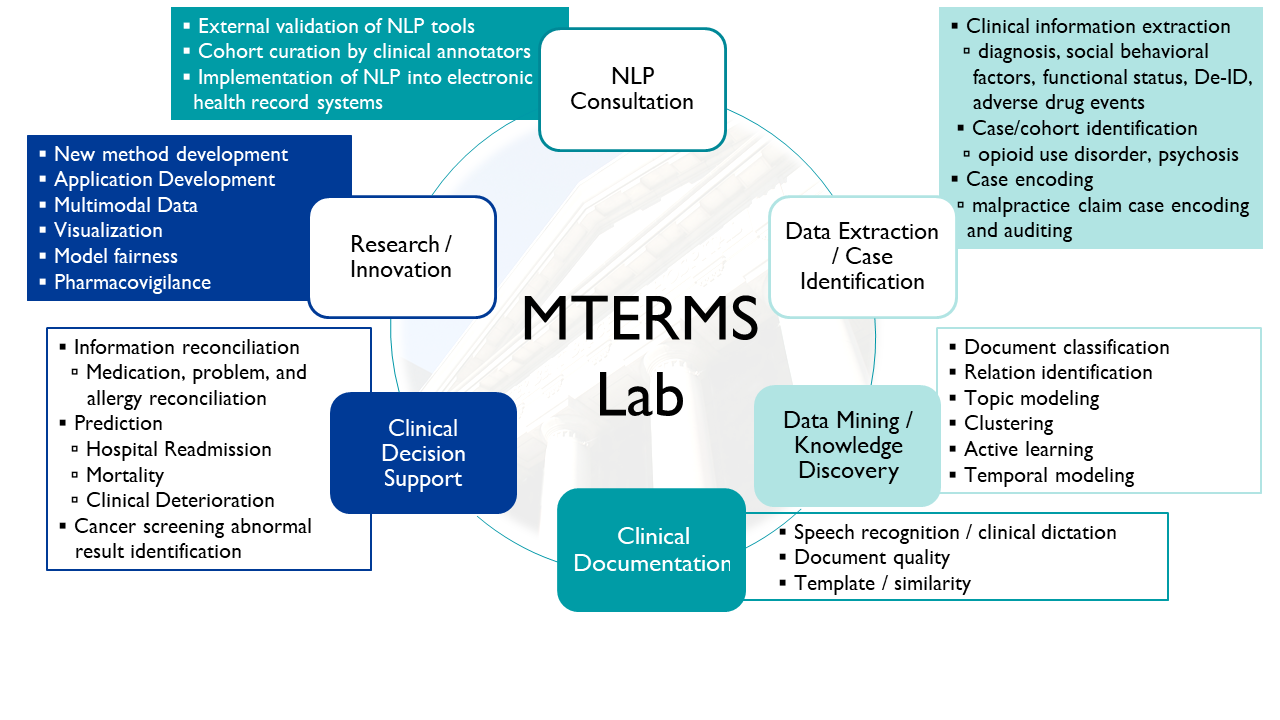
MTERMS is a natural language processing (NLP) ecosystem (including subsequent applications such as Deep Snow) for biomedical text. Originally designed to extract medication information from clinical notes to facilitate real-time medication reconciliation, MTERMS (branded as the Medical Text Extraction, Reasoning and Mapping System) has been extended to support a variety of clinical informatics applications and projects. The MTERMS ecosystem utilizes a mix of linguistics focused methods, unsupervised methods (e.g., clustering), and supervised statistical focused methods (e.g., machine learning, deep learning, active learning). These applications include:
- Clinical Documentation
- Automatic error checking of various free-text clinical documents, including misspellings in typed notes and “real-word” errors in dictated notes
- Mining similar notes to help generate note templates
- Information Extraction/Retrieval and Encoding
- Extracting diverse clinical information (e.g., diagnoses, symptoms, medications, social-behavioral information) from free-text clinical documents
- Encoding extracted information using standard medical terminologies (e.g., SNOMED-CT, ICD-9/10, RxNorm)
- Handling contextual information (e.g., sections, negations, status/changes)
- Generating output in standard (e.g., HL7 document standards) or custom formats
- De-identification of clinical notes
- Data Mining and Knowledge Discovery
- Documentation classification, e.g., classifying malpractice claim descriptions according to allegation, contributing factors, severity, and responsible service
- Clustering, e.g., discovering food allergen cross-sensitivity
- Relation identification, e.g., temporal reasoning over medical events
- Distributional semantic analysis, e.g., topic modeling to generate themes from social media posts and clinical documents
- Active learning, e.g., using word embeddings to assist information extraction tasks
- Clinical Decision Support
- Creating an application to facilitate clinical information reconciliation in the electronic health record
- Developing a prototype application for care coordination
- Developing a system for automatic malpractice case encoding and auditing
- Developing predictive models for identifying patients for early palliative care interventions
- Identifying patient cohorts (e.g., patients with heart failure)
- Research, Innovation and others
- Developing applications to identify adverse drug events (e.g., adverse drug reactions to opioids)
- Participating in community shared tasks (e.g., classifying psychiatric symptom severity for the 2016 i2b2 NLP Shared Task)